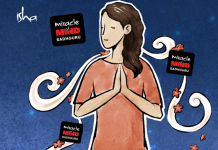The transition in a newborn baby from the intra-uterine life to an independent existence needs support and care form the mother, particularly in first two weeks. Unforeseen situations, for instance, no elderly guidance in nuclear families need to be tackled proficiently.
Essentially an infant must start breathing within 2 minutes of birth or else lack of oxygen to brain or lungs may result in fatal injuries. Within first week after birth, about half of all babies and large proportion of babies born prematurely develop physiological jaundice. This kind of jaundice is due to immature liver, is not serious and has no long-term effects. It is easily curable by putting the baby under fluorescent lights.
During first week, the cardio pulse is 130-150 times per minute, which reduces to 90 in week two. Newborn babies sleep for nearly 20 hours, which is normal. Babies can’t hear during first two days of birth. Senses like vision and hearing ability develops in weeks.
Sterilized clothes should be kept ready for the arrival of the baby who was in a highly protected and hygienic environment for about 38-40 weeks. Things like baby-cot, mattress, sheets, pillows, diapers must be kept ready for the baby to sleep in. Baby’s clothes made of skin friendly cotton, must be washed and kept separately. Mother nature also provides its own special care to the newborn baby by the layers of fat under its skin protecting them from atmosphere. Mild antiseptic detergents and antiseptics should be used for washing the clothes separately.
Since baby is easily susceptible to infections its better that only mother handles the baby. Visitors should not cuddle and kiss baby, as there might be a chance of infection.
The mother should develop a feeding pattern accordingly. As far as possible baby should not be breastfed at night as it may set an inconvenient pattern.
via these simple, easy to remember tips, expectant mothers can prepare themselves well before the arrival of a new angel brightens their life.
by Prof.Puja.M (Child care & Nutrition)






